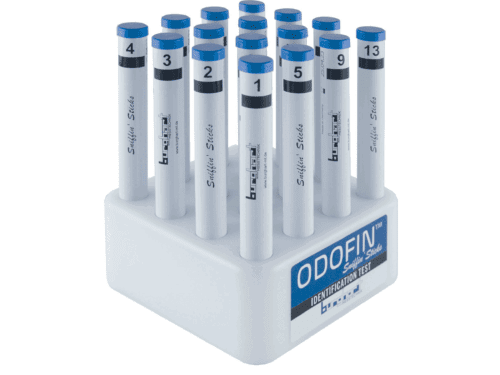
Do women smell better than men? I recently came across this question in Corpus (educational center) in Leiden and I thought it would be interesting to investigate this further. Various studies have been carried out using, among other things, our smell tests (such as the Extended Test and UPSIT smell test) to look at the differences in sense of smell in men and women. This research was carried out by the University of Wroclaw (Poland) in collaboration with the Universitätsklinikum Carl Gustav Carus (Germany). On this page a short summary and the conclusion.
Aim of this study
While the view that women’s sense of smell outperforms men’s is taken for granted, some large-sample studies have suggested that men’s and women’s senses of smell are, in fact, comparable. In recent years, the issue of intersex differences in odor perception seemed to have lost interest among scientists and the belief that female sense of smell is better than male sense of smell was taken as fact. However, some studies with large sample sizes of participants suggested that the ability to detect odor (Kern et al., 2014) or olfactory identification (Sorokowska et al., 2015b) is similar between the sexes.
The aim of this study is to test this difference and to see what the real situation is with men’s and women’s sense of smell.
How has the sense of smell been tested?
In this study, various odor tests were used in which an odor identification, threshold value and discrimination test were performed. This was done using the UPSIT smell test (identification of odors) and the Sniffin’ Sticks Extended Test (identification, threshold and discrimination of odors).
The sample consisted of 8848 persons (of which 5065 women and 3783 men) for the threshold test, 8067 persons (4496 women and 3571 men) for the discrimination test, 13670 (of which 7501 women and 6169 men) for the identification test, and a total sample of 7154 (of which 3866 women and 3288 men) for testing with the UPSIT identification smell test.
Difference between women and men
There are several factors that could potentially cause sex differences in smell test results. These include, for example, neuroendocrine, social and cognitive factors. Below is a brief description of these differences:
- The first reason for possible female superiority in olfactory perception is related to neuroendocrine agents and complex interactions between hormones and the olfactory system. There are several studies that have observed different relationships between hormones and sense of smell. In addition, threshold-level sensitivity to certain odors may be associated with menstrual cycle-related fluctuations. Also, such threshold-level olfactory sensitivity to specific stimuli (especially socially relevant odors) appears to be increased due to female sex hormones. However, sex differences in odor sensitivity are already observed in children, which makes the possible conclusions much more complex. In their study of sex differences in olfactory function, Doty and Cameron (2009) suggest that the female superiority observed in olfactory processing could be due to an interaction between early hormone-related influences on regions responsible for odor perception in the human brain and hormonal mechanisms that affect the sense of smell.
Second, olfactory performance may also depend on olfactory expertise due to greater odor awareness. Even in the case of newborns, female babies show more interest in olfactory cues. Scent awareness has been linked to female stereotyped activities in childhood and adulthood. Because women show higher olfactory awareness, they are more likely to pay attention and remember smells more often than men. Studies show that women are indeed more prone to increased sensitivity to certain fragrances as a result of exposure to these fragrances. Also, in most countries, women still spend more time preparing food than men, and many odor tests involve food-related odors.
- Third, verbal knowledge may also play a role in odor identification. Perhaps the sex differences in smell (especially odor identification) actually stem from lower verbal skills in men, making it easier for women to find the right names and answer the questions correctly.
- The last group of factors to consider is health related. First, men are usually more susceptible to occupational exposure to industrial chemicals and other harmful substances (e.g., cadmium, soot) associated with olfactory disorders. However, in this context, the sex difference should mainly be observed for threshold testing, while performance on suprathreshold olfactory tasks, such as identification or discrimination, should not be affected to this extent. Further, if the sense of smell weakens due to aging and men generally age faster than women, the sense of smell in men should decline more explicitly with age.
Nevertheless, careful examination of the putative factors determining sex differences in odor perception points to several contradictions regarding the expected performance of men and women in different types of tests and in different age groups. If some of the arguments presented above are true, then the expected differences should be observable to varying degrees in identification, discrimination and threshold tests. To answer this question, the researchers performed a meta-analysis on two most commonly used, standardized tests: Extended Sniffin’ Sticks Test and the University of Pennsylvania Smell Identification Test (UPSIT smell test).
Conclusion, do women smell better than men?
The results of the study and the various smell tests indicate that women generally outperform men in terms of sense of smell. However, as much as the study confirms that women are equipped with a slightly better sense of smell than men, the purpose of intersex differences in this regard remains speculative. As discussed earlier, olfactory performance may also depend on olfactory awareness, which appears to be higher in females even in early childhood. The fact that both neuroendocrine and cognitive factors support better senses of smell in women points to the special role that the sense of smell plays for them.
In summary, the study showed that certain gender differences exist in olfactory performance. While significant, the effects were very small and translate into very small absolute differences in odor test performance. Nevertheless, potential sex differences in sense of smell should be considered and controlled for in future studies.
The conclusion of this study is that women smell slightly better than men, but it should be emphasized that the difference that the researchers observed was remarkably small. A narrow victory for the female sex when it comes to smell.
Want to read the complete publication? Then click here.

 Second, olfactory performance may also depend on olfactory expertise due to greater odor awareness. Even in the case of newborns, female babies show more interest in olfactory cues. Scent awareness has been linked to female stereotyped activities in childhood and adulthood. Because women show higher olfactory awareness, they are more likely to pay attention and remember smells more often than men. Studies show that women are indeed more prone to increased sensitivity to certain fragrances as a result of exposure to these fragrances. Also, in most countries, women still spend more time preparing food than men, and many odor tests involve food-related odors.
Second, olfactory performance may also depend on olfactory expertise due to greater odor awareness. Even in the case of newborns, female babies show more interest in olfactory cues. Scent awareness has been linked to female stereotyped activities in childhood and adulthood. Because women show higher olfactory awareness, they are more likely to pay attention and remember smells more often than men. Studies show that women are indeed more prone to increased sensitivity to certain fragrances as a result of exposure to these fragrances. Also, in most countries, women still spend more time preparing food than men, and many odor tests involve food-related odors.





